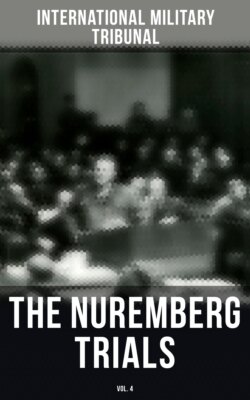Читать книгу The Nuremberg Trials (Vol.4) - International Military Tribunal - Страница 20
На сайте Литреса книга снята с продажи.
Оглавление“By a decree of the Führer dated 27 July 1934, I have been granted the right to participate in the legislation of the Reich as regards both formal laws and legal ordinances. This right must not be rendered illusory by the fact that I am sent the drafts of laws and decrees so late and am then given a time limit with the result that it is impossible for me to deal with the material concerned within the appointed time. I must point out that my participation means taking into account the opinion of the National Socialist Party as such and that, in the case of the majority of drafts of laws and decrees, I consult with the appropriate departments of the Party before making my comment. Only by proceeding in this manner can I do justice to the wish of the Führer as expressed in the decree of the Führer of 27 July 1934. I must therefore ask the Reich Ministers to arrange that drafts of laws and decrees reach me in sufficient time. Failing this, I should be obliged in the future to withhold my agreement to such drafts, from the beginning and without giving the matter detailed attention, in all cases where I am not given a sufficiently long period for dealing with them. Heil.”—Signed Rudolf Hess.
A handwritten note appears attached to the letter. It reads, and I quote from Page 2 of the translation:
“Berlin, 17 October 1934.
“1. The identical letter seems to have been addressed to all Reich Ministers. In our special field the decree of 27 July 1934 has hardly become applicable so far. A reply does not seem called for.
“2. File. By order”—signed—“R.”
The participating powers of Hess were later broadened. I now refer to Document D-140, Exhibit USA-405; and it is a letter dated the 12th of April 1938 from Dr. Lammers to the Reich Ministers. I offer it in evidence and quote from the English translation, Paragraph 3:
“Under the provisions of Paragraph 3 of the first decree concerning reconstruction of the Reich, of February 2d, 1934 (Reichsgesetzblatt I, Page 81), the Führer’s Deputy will also participate in the approval by Reich Ministers of laws and legislative ordinances of Länder. Where the Reich Ministers have already at an earlier date been engaged in the preparation of such laws or legislative ordinances or have participated in such preparation, the Führer’s Deputy likewise becomes participating Reich Minister. Laws and legislative decrees of the Austrian State are equally affected hereby.”—Signed—“Dr. Lammers.”
THE PRESIDENT: Colonel Storey, may I ask you what those three documents are supposed to prove?
COL. STOREY: In the first place, Your Honor, the one I have just referred to shows that they passed laws over conquered territory—that one related to Austria. The one signed by Hess, just before, gives him almost unlimited power as regards both formal and legal ordinances and over administrative districts; and in addition, I think, Your Honor, the most important point is that Hess says: You must send them to me long enough in advance so that I may consult with the Party and the appropriate Party members and get their reaction.
THE PRESIDENT: Is that relied upon as evidence of criminality, that he took the trouble to find out what other ministers thought?
COL. STOREY: I think it is a part of the general conspiracy showing the domination of Party and State by the Nazi Party and particularly the Leadership Corps.
THE PRESIDENT: I thought I had already said that it appeared to us—and I think I speak on behalf of all the Tribunal—that that matter had been amply proved and that we wished you to turn to the question of criminality of the Reich Cabinet.
COL. STOREY: May I assume, Your Honors, that we need to offer no further proof that the Party itself had to do with the making of these laws as suggested by the Defendant Hess? I thought it was incumbent upon us to prove that the Party dominated this Cabinet, and particularly the Leadership Corps.
THE PRESIDENT: You are dealing now with the Reich Cabinet, and I think the Tribunal is satisfied that the Reich Cabinet had full powers to make laws.
COL. STOREY: I think that we go a little step further and undertake to show, if we have not already shown, that the way and manner in which they did it—by consulting the Party—was criminal. Now, I have some other laws to cite here in corroboration of that; but, if the Tribunal is satisfied, I don’t see any use in citing them.
THE PRESIDENT: I don’t think the Tribunal would imagine that they made laws without consulting somebody. Perhaps it would be a convenient time to break off for 10 minutes.
